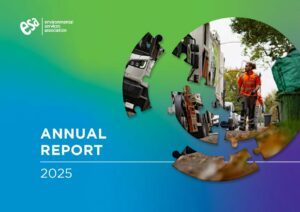Three weeks into the General Election campaign the main political contenders have now published their manifestos, painting a picture of what life in the United Kingdom would look like if their party gets to form the next government.
However, for the recycling and waste treatment sector, that picture remains something of a blank canvas.
In addition to laudable promises to take tougher action on waste crime, the Conservative manifesto pledged to put an immediate halt to energy-recovery projects and revoke planning consent for projects not under construction. From the ESA’s perspective, this heavy-handed retrospective action would raise the political risk around all circular economy infrastructure investment (not just for energy recovery facilities) at a time when we desperately need to be building new recycling infrastructure to meet the nation’s existing circular economy ambitions.
The Liberal Democrats and Green Party arguably had the most to say of interest to our sector, setting out more wide-ranging ambitions for the circular economy, recycling, plastics and environmental protection.
The Lib Dem manifesto promises action on plastics, with an expanded Deposit Return Scheme for England aligned with the devolved administrations; the complete elimination of non-recyclable single-use plastics within three years (replacing them with the somewhat dubious-sounding “affordable alternatives”) and “an ambition” to end plastic waste exports by 2030. The ESA believes that, in the longer term, only sorted material that meets clear, objective, high, quality standards should be exported – which would maintain access to markets while also on-shoring sorting and processing activity creating green jobs and economic growth.
The Liberal Democrats also promise more stringent requirements on businesses over biodiversity and net-zero reporting, both of which would be welcomed by the ESA, as well as reforms to grid connections and energy networks alongside measures to align UK and European Emissions Trading Schemes.
The Greens meanwhile have focused on re-use and repair, and would place a requirement on manufacturers to offer ten-year warranties on white goods and the introduction of “a comprehensive right to repair” to eliminate built-in obsolescence. They would “encourage a shift from an ownership to a usership model” – citing car-sharing platforms and neighbourhood tool libraries (both of which arguably already exist) as examples. Their manifesto also pledges a £30bn research budget over a five-year parliament of which some would be focused on re-use, repair, recycling and designing out waste. Enticing, but we’re sadly unlikely to see a penny of it.
So, if polling figures represent the most realistic outcomes – what does Labour have to say? In its 23,000 word manifesto, there was seemingly only a brief reference to our sector which expressed a “commitment to reducing waste by moving to a circular economy”. No further detail was offered about how this would be achieved.
Additionally, in the context of tackling anti-social behaviour, Labour would also force fly-tippers and vandals to clean up the mess they have created. Hear! Hear! but this far from reflects the annual billion-pound plus totality of waste crime and the corresponding need for comprehensive regulatory reform.
However, this absence of new ideas in the manifesto is not necessarily a bad thing. After six years of pursuing major resources and waste policy reforms, our sector needs policy evolution, not revolution. Momentum has gathered over the past 12 months on the core Resources and Waste Strategy (RWS) reforms and our industry now needs stable, clear, investable policy conditions to deliver national resource-efficiency and net-zero targets.
As I wrote on the day Sunak called the snap election, it is essential that the new Government – of any political colour – keeps a steady course on the RWS packaging reforms now we’re nearing our destination. This will create a stable climate for investment that will deliver thousands of green jobs, world-class infrastructure and a more circular, less wasteful lower-carbon economy – goals worthy of any manifesto even if they weren’t explicitly mentioned.
Against all this, we have the backdrop of the inclusion of energy-recovery in the Emissions Trading Scheme (ETS) from 2028 – a policy agenda the next Government will inherit and be responsible for delivering. This innocuous sounding policy measure promises an even greater economic shake-up of our sector than the RWS and is fraught with complexity – offering multiple avenues for unintended consequences, increased costs and failure. It also offers a fantastic opportunity to support delivery of our sector’s Net-Zero goals by reducing waste, diverting more residual waste into recycling, and underpinning carbon capture investment.
The new Government must maintain momentum on the ETS and continue to engage closely with stakeholders. It must also accompany the ETS expansion with a comprehensive landfill ban and measures to support recycling, re-use and avoidance. Additionally, to ensure the ETS drives down emissions and doesn’t simply burden councils and waste producers with unavoidable extra costs the ESA would like to see it balanced with new measures to increase market demand for recycled material (particularly plastics), which is why a long-term escalator on the rate and threshold for the plastic packaging tax should also be on future policy-makers’ priority lists.




